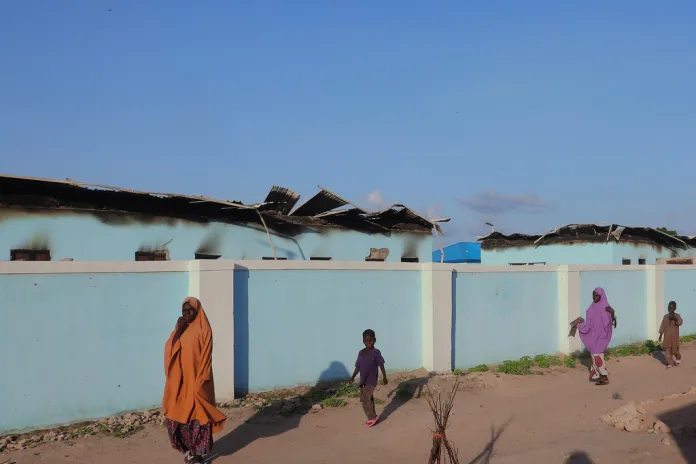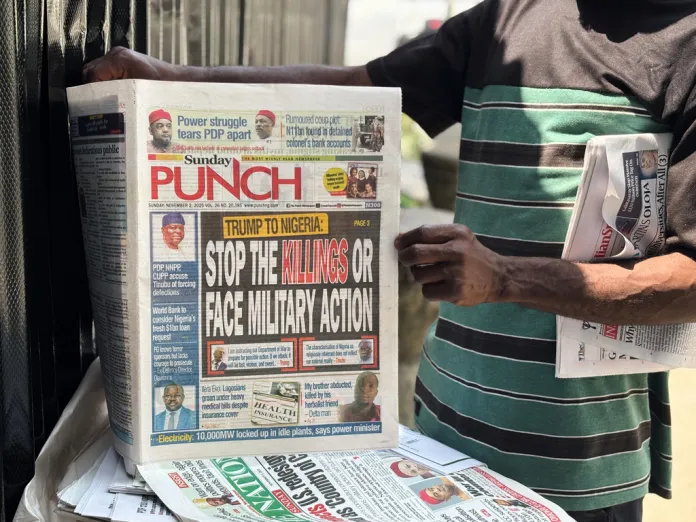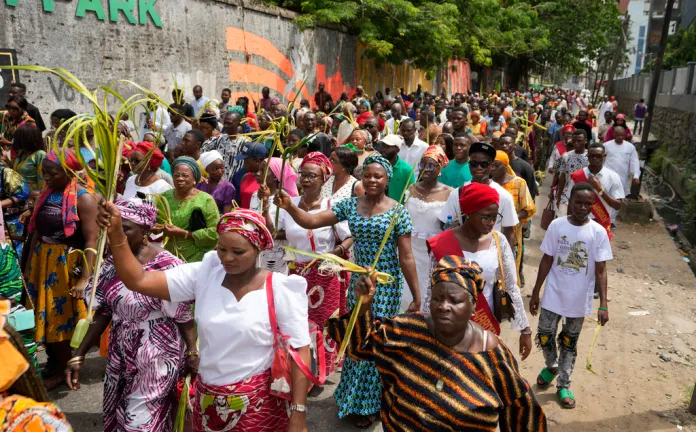President Donald Trump‘s threat of military operations in Nigeria to save persecuted Christians is likely more of a pressure tactic to see the Nigerian government’s efforts to step up, according to experts.
On Saturday, Trump instructed the Department of War to “prepare for possible action” in Nigeria, threatening to “immediately stop all aid and assistance” and to come into the African nation “guns-a-blazing.”
Secretary of War Pete Hegseth affirmed the call-to-arms with an emphatic “Yes, sir.”
“The killing of innocent Christians in Nigeria — and anywhere — must end immediately,” Hegseth said in a reply to Trump’s warnings. “The Department of War is preparing for action. Either the Nigerian Government protects Christians, or we will kill the Islamic Terrorists who are committing these horrible atrocities.”
Experts told the Washington Examiner that the violence in the West African nation expands beyond the persecution of Christians, who make up just under half of the Nigerian population. Demographic research cited by the State Department asserted that Christians account for 48.1% of the population compared to 50% Muslims.
Targeted violence differs based on geography
“There are several different issues at play here. I fear that our president isn’t fully briefed on all of it because you have this horrendous violence in the north. In the northeast, it’s Boko Haram and its offshoot to the Islamic State West Africa Province,” former U.S. Ambassador to Ethiopia and Guinea Tibor Nagy told the Washington Examiner.

He continued, “In the north middle, you have literally thousands of kidnapping by armed gangs. And then in the Northwest, you now have a threat from the other Muslim extremist organization, [Jama’at Nusrat al-Islam wal-Muslimin], which is mostly operating at Burkina Faso, Niger, and Mali.”
JNIM is a Salafi-jihadist organization based in West Africa that aligns with al Qaeda. The group was formed in 2017 when four Mali-based extremist groups, Ansar al Din, al Murabitun, the Macina Liberation Front, and the Sahara, merged into one, according to the Director of National Intelligence’s counterterrorism guide.
Boko Harem pledged allegiance to ISIS about a decade ago and gained notoriety in 2014 when the group kidnapped 276 school girls in Borno State, Nigeria.
“There undeniably, it is mostly Muslim-on-Muslim violence, but then you come a little bit further south to what’s called the middle belt of Nigeria, and that’s where the violence has been taking place” that Trump referenced, said Nagy, who served as the assistant secretary of state for African Affairs during the first Trump administration.
Christians tend to live in that middle belt area and have come under the threat of violence not only from those terrorist groups but also from Muslim herders who move during the crop cycles.
“That’s where the great majority of the victims have been Christians, because the Fulani [herders] are armed, they’re quite aggressive, their animals will eat up the crops of the farmers,” Nagy continued. “And the farmers are not nearly as well defended. The Nigerian government is basically prominent by its absence, especially in the absence of security in that area.”
Nagy was skeptical of possible U.S. military intervention, noting that much of the Fulani violence is decentralized and random. However, he noted that the U.S. could target the terrorist groups operating in Northern Nigeria.
“If he wants to go after the Islamic extremist organizations in the far north, great, they need to be gone after, but that’s not going to solve the problem of the Christian farmers in the middle belt,” Nagy continued.
Even if they did target those terrorist groups, Nagy said it wouldn’t affect the Christian farmers in the middle belt “because what you have is literally thousands of herders moving and they’re individual herders with AK-47 rifles, or groups of herders […] How many hundreds of thousands of troops are you going to send to protect every single Christian farmer or every single Christian village?”
Anti-Christian violence happens because leaders turn a ‘blind eye’
The Rev. Cosmas Nzeabalu is a Catholic priest in the Diocese of Brooklyn, serving in a coordinating role with its Nigerian Apostolate. The apostolate, an ethnic subcommunity within the parish, is home to multiple Nigerian refugees who fled religious persecution and many more who came from regions torn apart by the violence.
Nzeabalu, who has outspokenly supported Nigerian Christians for years, said that while the roaming violence may not be government-directed, leaders are obviously being intentional in allowing it to go unpunished.
“When you have some of these tyrants, the more brutal life is for people, the more people fear. And the more people fear […] it is to their own advantage,” Nzeabalu told the Washington Examiner.

“The way the government acts shows that they keep a blind eye to some of this […] because nobody is brought to book based on the way they kill,” he added. “Some of these guys carry weapons — they carry huge AK-47 and they move around freely in a country where people are not supposed to have arms.”
Their faith-based pacifism has made them an easy target for the various groups.
“In the Christian world, there is no militia, as much as I know, that exists among them. Because we are not guerrilla warriors. We’re followers of Christ,” Nzeabalu said, pointing to scripture. “Don’t kill. Let the Lord fight your war.”
He pointed to the Biblical account of St. Peter drawing his sword to prevent authorities from arresting Jesus, to which he is rebuked: “Put up again thy sword into its place: for all that take the sword shall perish with the sword.”
“Different ideologies that carry arms and all that — the Muslims are so good at that — that’s why it’s easier for them to run such a system,” Nzeabalu continued. “So the only way that Christians could be saved is for the government […] to fund the police, to train the police, and to make sure that the [police] are dedicated.”
He added, “Also, to use the military to flush away the original people who are doing this and then to have a very strong law, because the problem is that the law is not followed.”
James Barnett, a research fellow at Hudson Institute based in Nigeria, told the Washington Examiner that focusing exclusively on the Christians being killed actually “detracts from the main point, which is that there’s a problem of rampant insecurity in Nigeria that is not limited to targeting the faith group and I think that here it’s also really important to stress how many different militant organizations there are in Nigeria.”
The United States could carry out a tactical strike against some of the jihadist factions operating in the country, Barnett speculated, though he said it wouldn’t “really change the facts on the ground.”

The threat of possible U.S. military intervention would seemingly contradict Trump’s long-standing stance against U.S. intervention abroad in conflicts that don’t directly involve it.
Congress has not authorized any new wars since the second Trump administration began, but since then, the U.S. has carried out operations in Yemen, Iran, and in Caribbean waters.
The Nigerian government seems to believe that Trump’s “guns-a-blazing” threats are more rhetorical than literal.
NIGERIA DISMISSES TRUMP’S MILITARY THREAT, SAYS HE MERELY WANTS A ‘SIT-DOWN’
Daniel Bwala, spokesman for Nigerian President Bola Ahmed Tinubu, said Sunday that the bombastic statements are just Trump’s “style of going forceful in order to force a sit-down and have a conversation.”
However, that rhetoric seems to work, as Bwala said a meeting between the two countries could happen “in the coming days.”
